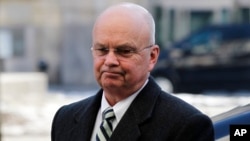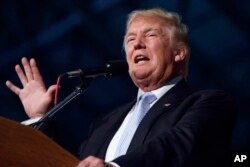Former CIA Director Michael Hayden added his voice Wednesday to growing calls for President-elect Donald Trump to be more open to the intelligence community and to embrace findings that may be at odds with his personal beliefs.
"It's not just a question of the Russian hacking and his seeming reluctance to accept what appears to be good evidence that the Russians did this," Hayden said, referring to a CIA assessment that Russia intervened in the U.S. presidential election to help Trump win.
"It's the broader question I'm concerned about: Will the president elect — the president — accept the intelligence guys to come in and give him points of view that are different from his a priori assumptions or beliefs?" he said. "That's really important."
Hayden, a retired Air Force general, headed the U.S. National Security Agency from 1999 to 2005 and later served as CIA director in former President George W. Bush's administration from 2006 to 2009.
'Never seen it'
Leon Panetta, who succeeded Hayden as CIA director and served during President Barack Obama's first term in office, and former U.K. Prime Minister David Cameron urged Trump on Wednesday to accept the daily intelligence briefings offered to incoming presidents despite Trump's reluctance.
"I have never seen a president who has said, 'I don't want that stuff.' Never seen it,'' Panetta said Wednesday at the Arab Strategy Forum in Dubai.
Trump has dismissed U.S. intelligence findings that Russia sought through hacking to influence the election in his favor and has questioned the utility of the daily intelligence briefings.
He told Fox News on Sunday that he was not interested in receiving the same information every day. In his stead, he said, Vice President-elect Mike Pence and "my generals" received the briefings.
Sean Spicer, a spokesman for Trump's transition team, said Wednesday that the president-elect was getting formal intelligence briefings at least three times a week.
The high-level intelligence briefing, known as the President's Daily Brief, has been a fixture for U.S. presidents since John F. Kennedy took office in 1961.
But not every president has received it directly. Hayden noted that former President Jimmy Carter had his national security adviser, Zbigniew Brzezinski, attend and later summarize the daily briefings for him.
"Maybe President Trump will do that," Hayden said. "In today's world, though, and for the last 16 years, it's been a daily brief, more or less."
'Open dialogue'
Having an "open dialogue" with the intelligence community will make Trump "a better president," he said.
"And with that, more is better than less, personal is better than impersonal, and dialogue is better than just tossing a report on his desk," Hayden said in an interview with VOA on the sidelines of a terrorism conference hosted by the Jamestown Foundation, a Washington think tank.
In his comments at the conference and in the interview with VOA, Hayden expressed skepticism about Trump's stated desire to join forces with Russian and Syrian governments to battle Islamic State militants.
Russian and U.S. interests do not converge in the region, he said. While the U.S. aim in Syria and Iraq is to defeat the militant group, the Russian goal is the "preservation" of Syrian President Bashar al-Assad's regime.
"If there are small, specific tactical places where our interests coincide, we should absolutely cooperate. But at the strategic level, I actually think we're heading in different directions," Hayden said.

